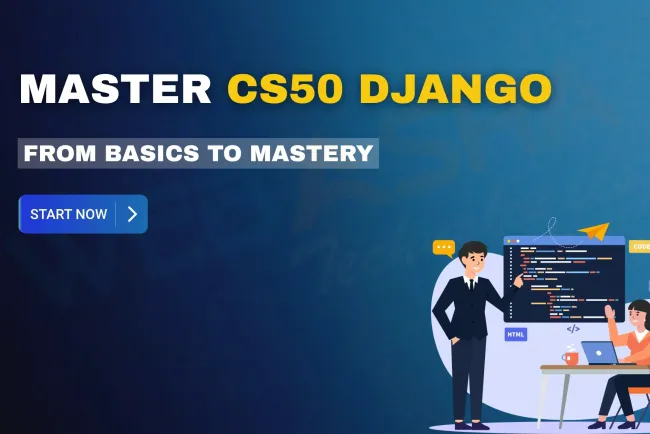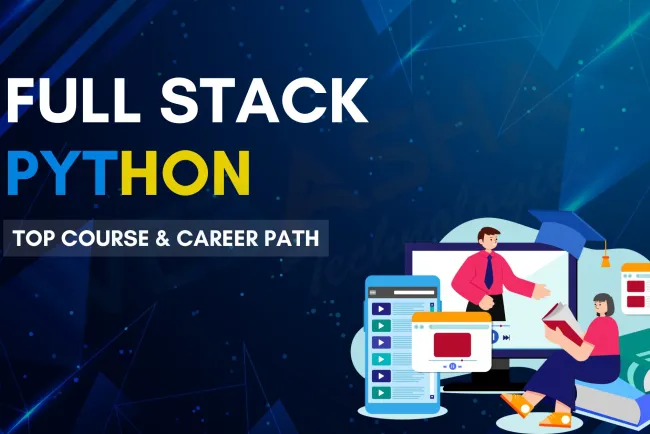Python with Django Course | Learn Full-Stack Web Development from Scratch
Master full-stack web development with a comprehensive Python with Django course. Learn Python programming, Django framework, real-world projects, and get certified to launch your web development career.

Table of Contents
- Who Should Take a Python with Django Course
- Key Concepts Covered in a Python with Django Course
- What Will You Learn in a Django Bootcamp?
- Hands-On Projects You’ll Build
- Skills You Gain from a Python with Django Course
- Career Opportunities After Completing the Course
- Benefits of Taking a Python with Django Course
- What Prerequisites Do You Need?
- Certifications After Python with Django Course
- Learning Python with Django Online vs Offline
- How to Choose the Best Python with Django Course
- Common Challenges and How to Overcome Them
- Conclusion
- Frequently Asked Questions (FAQs)
In today’s tech-driven world, building scalable and dynamic web applications is a top priority for developers and businesses. If you're aiming to become a proficient full-stack developer, a Python with Django course is your gateway to mastering one of the most powerful combinations in modern web development. Whether you're a student, job seeker, or entrepreneur, learning Django with Python equips you to create robust applications, streamline backend logic, and accelerate your path into tech.
This guide covers everything about the Python with Django course—what you’ll learn, career benefits, skills required, job roles, certifications, and more.What is a Python with Django Course?
A Python with Django course teaches you how to use Python as a backend language and Django as a web framework to build full-stack web applications. Django simplifies complex development by providing built-in tools like user authentication, admin panel, and ORM for database management.
You’ll start by mastering core Python, then transition to Django’s MVC (Model-View-Controller) pattern, and ultimately build projects such as blogs, e-commerce sites, and social media platforms.
Who Should Take a Python with Django Course?
This course is ideal for:
-
College students seeking internships or placements
-
Beginners in programming and web development
-
Frontend developers looking to become full-stack
-
Professionals switching to backend roles
-
Freelancers building web applications
Key Concepts Covered in a Python with Django Course
A good Python with Django course includes both foundational and advanced modules. Here’s a breakdown of core topics:
Python Fundamentals
-
Variables, Data Types, and Operators
-
Loops, Conditions, and Functions
-
Object-Oriented Programming (OOP)
-
File Handling
-
Exception Handling
Advanced Python
-
Lambda and Decorators
-
List Comprehensions
-
Modules and Packages
-
Virtual Environments
Django Framework
-
Installation and Setup
-
Project Structure
-
URL Routing
-
Views and Templates
-
Models and ORM (Object-Relational Mapping)
-
Django Admin Interface
-
User Authentication and Permissions
-
Form Handling and Validation
-
Static and Media File Management
-
Middleware and Security
-
REST API Basics with Django REST Framework (optional in some courses)
Why Choose Python with Django for Web Development?
-
Rapid Development: Django comes with built-in modules, reducing development time significantly.
-
Scalability: Django is used by platforms like Instagram, Disqus, and Pinterest—proving its robustness.
-
Security: Prevents SQL injections, XSS, and CSRF attacks out of the box.
-
Community Support: Extensive documentation and large developer communities.
-
Job-Oriented: Many startups and companies demand Django for their backend.
Hands-On Projects You’ll Build
Project-based learning is the core of any effective Python with Django course. Common projects include:
-
Personal Blog Website
-
To-Do App with Authentication
-
Online Store with Cart and Checkout
-
Job Portal or Resume Builder
-
Weather App Using APIs
-
Django-based Admin Dashboard
These projects not only help in learning but also build your portfolio for jobs and freelancing.
Skills You Gain from a Python with Django Course
-
Proficiency in Python programming
-
Web architecture understanding
-
MVC/MVT design pattern
-
Database management using Django ORM
-
Full-stack project deployment
-
REST API integration (in advanced courses)
-
Debugging and testing Django apps
Career Opportunities After Completing the Course
Completing a Python with Django course opens the doors to several high-demand roles, including:
| Job Role | Average Salary (India) |
|---|---|
| Django Developer | ₹4 – ₹8 LPA |
| Python Full-Stack Developer | ₹5 – ₹10 LPA |
| Backend Web Developer | ₹4 – ₹9 LPA |
| Software Engineer (Python/Django) | ₹6 – ₹12 LPA |
| Web Application Developer | ₹3.5 – ₹7 LPA |
With experience and project expertise, these figures can increase significantly.
Benefits of Taking a Python with Django Course
-
Beginner-Friendly: Python’s simplicity and Django’s structure make learning easier.
-
Job-Oriented: Aligned with current industry demands in web development.
-
Scalable Projects: Suitable for small and large applications alike.
-
Free and Open-Source: Both Python and Django are free to use.
-
Fast Learning Curve: With the right guidance, you can build your first app in days.
What Prerequisites Do You Need?
-
Basic understanding of HTML/CSS is helpful
-
Logical reasoning and problem-solving skills
-
No prior experience in backend development is required
Most courses start from the basics, so even complete beginners can catch up quickly.
Certifications After Python with Django Course
Many courses offer a certificate of completion which adds value to your resume. Additionally, you can pursue certifications like:
-
Python Institute Certifications (PCAP, PCEP)
-
Microsoft Python Certification
-
Coursera/edX Verified Django Certificates
-
WebAsha's Python with Django Certificate
These certificates validate your skills and increase your visibility to employers.
Learning Python with Django Online vs Offline
| Aspect | Online | Offline |
|---|---|---|
| Flexibility | Learn anytime, anywhere | Fixed schedule, physical location required |
| Learning Speed | Self-paced | Instructor-paced |
| Interaction | Limited (unless live classes) | In-person guidance |
| Project Reviews | Mostly peer/self-reviewed | Instructor-reviewed |
| Cost | Often more affordable | Can be more expensive due to infrastructure |
Choose based on your preferred learning style, discipline, and availability.
How to Choose the Best Python with Django Course
Here are a few factors to consider:
-
Curriculum: Ensure it covers both Python and Django in depth
-
Project Work: Courses with real-world projects are better
-
Certification: Look for recognized certification
-
Trainer Expertise: Check for experienced professionals or mentors
-
Placement Assistance: Choose courses with job support if you're career-focused
Common Challenges and How to Overcome Them
1. Setting up Django Environment
Use guides or IDEs like PyCharm, VS Code, or online platforms like Replit for easier setup.
2. Understanding the MVT Architecture
Spend time understanding how models, views, and templates interact.
3. Debugging Errors
Use Django’s detailed error logs and leverage Stack Overflow, GitHub, or communities.
4. Connecting Frontend and Backend
Start with built-in Django templating before using React or Vue for frontend frameworks.
Conclusion: Is Learning Python with Django Worth It?
Absolutely. A Python with Django course is a fast-track route to becoming a web developer. With powerful frameworks, easy syntax, and global demand, it’s one of the best investments you can make in your tech career. Whether you're building portfolio projects, launching a startup, or applying for software jobs, Django skills will serve as your foundation for success.
FAQs
What is a Python with Django course?
A Python with Django course teaches how to build full-stack web applications using Python programming and the Django web framework.
Who should learn Django with Python?
It is ideal for students, beginners, full-stack aspirants, and backend developers looking to build scalable web applications.
Is Django good for full-stack development?
Yes, Django supports the entire backend logic and works seamlessly with frontend technologies for full-stack development.
Do I need to know Python before learning Django?
Basic knowledge of Python is helpful, but many courses cover Python fundamentals before diving into Django.
What skills will I gain from a Python with Django course?
You will learn Python, Django MVT structure, ORM, user authentication, form handling, and building real-time web applications.
How long does it take to learn Django with Python?
It typically takes 2 to 3 months with consistent practice, including project work.
Can I get a job after completing a Python with Django course?
Yes, completing a Django course can qualify you for roles like full-stack developer, backend developer, or Django specialist.
What are the career opportunities after this course?
You can apply for roles such as Django Developer, Python Full-Stack Developer, Web Application Developer, and Backend Engineer.
Is Python Django in demand?
Yes, Django is widely used by companies for rapid backend development due to its scalability and security features.
What is Django used for in Python?
Django is used to build web applications with efficient database handling, user management, and scalable architecture.
Is Django better than Flask for beginners?
Yes, Django is more structured and comes with built-in features, making it ideal for beginners aiming for rapid development.
What projects can I build in a Django course?
Common projects include blogs, e-commerce sites, to-do apps, social media apps, dashboards, and job portals.
Does Django support REST APIs?
Yes, with Django REST Framework (DRF), you can easily create and manage RESTful APIs.
Can I learn Django online?
Yes, many platforms offer online Django courses with video tutorials, hands-on projects, and certification.
What is the difference between Python and Django?
Python is a programming language; Django is a web framework built on Python for developing web applications.
Is Django only for web development?
Primarily yes, Django is used for web development, but it can also support API development and backend logic for apps.
Do I need to learn frontend before Django?
Basic HTML and CSS knowledge is helpful, but not mandatory before learning Django.
Is Django suitable for beginners in programming?
Yes, especially when paired with a Python beginner module, Django is beginner-friendly.
What kind of certificate will I get after the course?
You’ll receive a course completion or industry-recognized certification, depending on the provider.
Can Django be used with React or Angular?
Yes, Django can serve as the backend while React or Angular handle the frontend.
Is Django free to use?
Yes, Django is open-source and completely free to use for both learning and professional projects.
Are there prerequisites for taking this course?
Basic computer knowledge and logical thinking are enough. Python basics are usually taught at the beginning.
Which companies hire Django developers?
Tech startups, software development firms, e-commerce platforms, and fintech companies hire Django developers.
Is Django easier than Node.js?
Django may be easier for Python users and provides more built-in features, while Node.js offers more flexibility.
How is Django different from other frameworks?
Django follows the "batteries-included" approach, offering built-in features like authentication, admin panel, and ORM.
Can I freelance after learning Django with Python?
Yes, many freelancers build web applications and manage backend systems using Django.
What is Django ORM?
Django’s ORM (Object-Relational Mapping) lets you interact with the database using Python code instead of raw SQL.
How do I deploy a Django application?
You can deploy Django apps using platforms like Heroku, AWS, or DigitalOcean with tools like Gunicorn and Nginx.
What is the average salary after a Python Django course?
Django developers in India can earn between ₹4 to ₹12 LPA based on experience and skills.
Where can I join a Python with Django course in Pune?
You can join WebAsha’s Python Django Course in Pune for expert-led training, real-world projects, and certification.














![Top 10 Ethical Hackers in the World [2025]](https://www.webasha.com/blog/uploads/images/202408/image_100x75_66c2f983c207b.webp)








